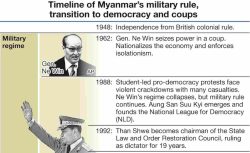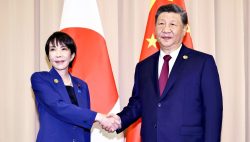Increase in ‘Unclaimed Bodies’: Is It Sufficient to Leave Measures up to Local Govts?
16:11 JST, November 20, 2024
The number of “unclaimed bodies” that have no one to retrieve them after death is increasing. As the population grays, this is expected to continue in the future. It is time for society as a whole to seriously consider how to deal with this issue.
According to the results of a first-ever survey conducted by the Internal Affairs and Communications Ministry, which was released last year, about 106,000 unclaimed bodies were confirmed nationwide from April 2018 to October 2021. A survey by The Yomiuri Shimbun covering major municipalities found that the number had grown by more than 30% in the five years through fiscal 2022.
In addition to more elderly people living alone, another reason behind the increase of unclaimed bodies is said to be that even if the deceased persons have relatives, they often refuse to claim the bodies due to their estrangement from the dead. This situation can be described as symbolic of today’s era of weakening interpersonal ties.
When the body of a person who died alone is found, the local government checks relatives’ contact information and confirms whether they are willing to retrieve the body. If no relatives can be found, or they refuse to take the body, the local government will cremate the person in accordance with the law on cemeteries and burial, among other regulations.
However, it can be time-consuming to contact relatives, and this places a heavy burden on local governments. In Nagoya, an unclaimed body was left at a funeral service provider’s cold storage facility for more than three years. Such an incident can occur anywhere.
According to a fact-finding survey by the Health, Labor and Welfare Ministry, only 10% of local governments have manuals on concrete measures to handle unclaimed bodies. Many local governments are struggling with this issue, as they may receive complaints from relatives depending on how they handle the situation.
The central government needs to provide uniform guidelines for specific procedures, such as how distant of relations should be contacted, how to find the relatives and how long to keep the bodies and remains, rather than leaving such matters up to local governments.
First, it is hoped that the central government, local governments, medical and nursing care providers, and funeral service providers, among others, will exchange information and identify issues to be addressed.
The number of single-person households aged 65 or older accounted for 13% of all households as of 2020, but it is predicted to exceed 20% in 2050. The problem of unclaimed bodies could become even more serious.
Some municipalities have set up a consultation service where elderly people can ask for advice, while they are still alive, on how to arrange for their funerals and the handling of their remains after their deaths.
For example, the city of Nagano has established an “Ohitorisama” Anshin Support (support of solitary people’s peace of mind) counseling office to assist with end-of-life planning for people living alone. The office reportedly listens to the worries of people who have no relatives to rely on and offers advice on matters from life after retirement to postmortem procedures.
Now that the number of single people is increasing and human relationships are becoming more tenuous, it is important for each individual to think early about how to approach the end of their life.
(From The Yomiuri Shimbun, Nov. 20, 2024)
Top Articles in Editorial & Columns
-

Myanmar Will Continue Under Military Rule Even After Election, Ex-Ambassador Maruyama Says in Exclusive Interview
-

40 Million Foreign Visitors to Japan: Urgent Measures Should Be Implemented to Tackle Overtourism
-

Expansion of New NISA: Devise Ways to Build up Household Assets
-

China Criticizes Sanae Takaichi, but China Itself Is to Blame for Worsening Relations with Japan
-

Withdrawal from International Organizations: U.S. Makes High-handed Move that Undermines Multilateral Cooperation
JN ACCESS RANKING
-

Univ. in Japan, Tokyo-Based Startup to Develop Satellite for Disaster Prevention Measures, Bears
-

JAL, ANA Cancel Flights During 3-day Holiday Weekend due to Blizzard
-

China Confirmed to Be Operating Drilling Vessel Near Japan-China Median Line
-

China Eyes Rare Earth Foothold in Malaysia to Maintain Dominance, Counter Japan, U.S.
-

Japan Institute to Use Domestic Commercial Optical Lattice Clock to Set Japan Standard Time



















